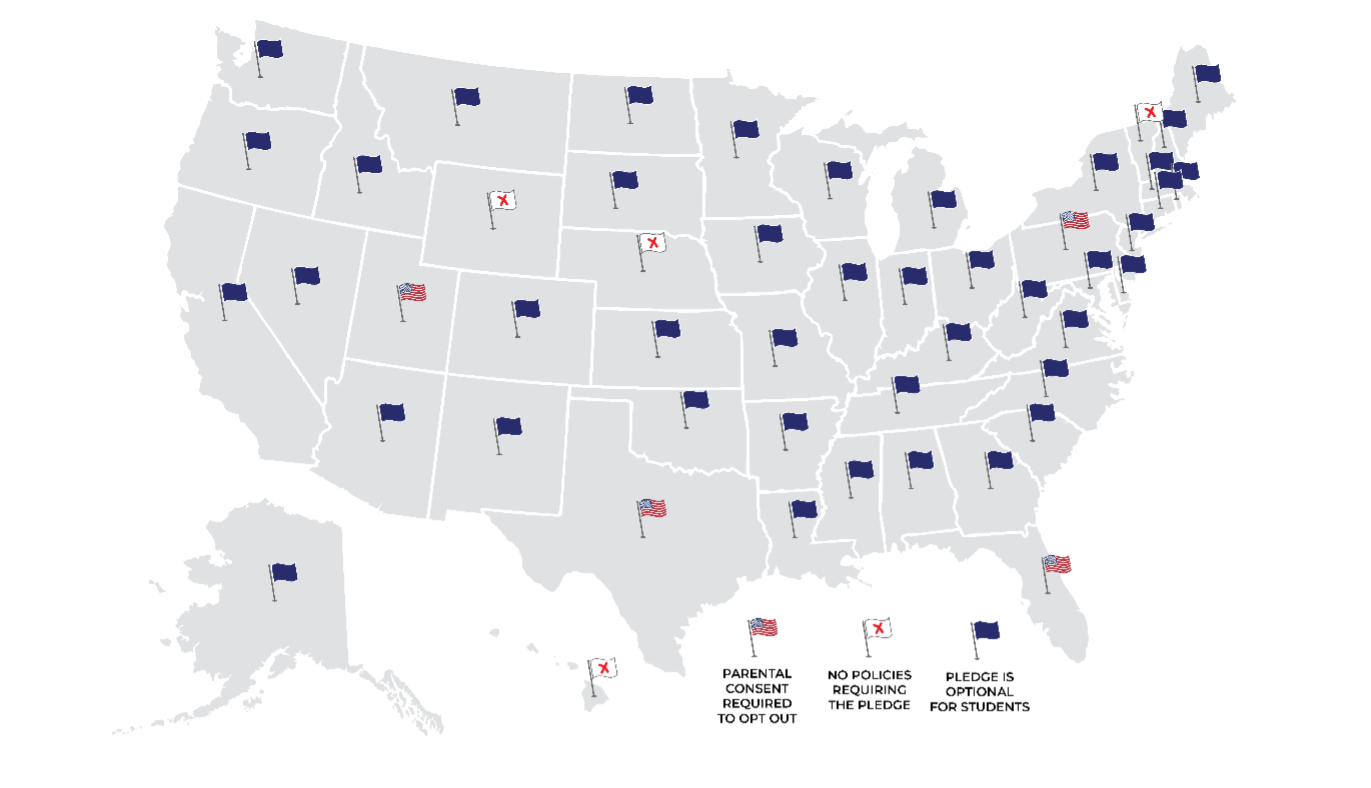Honoring The American Flag in Schools
Key Takeaways
Given waning patriotism among younger generations, we must prioritize displaying and pledging allegiance to the American flag in schools to help K–12 students understand and appreciate our core values of liberty and freedom.
In most states, the Pledge of Allegiance is optional in public schools, and students can opt out without parental consent.
States should follow the examples of Florida, Utah, Pennsylvania, and Texas by passing legislation that requires written consent from parents or guardians for students to opt out of reciting the pledge. States should also mandate display of the flag in classrooms and on district buildings, as in Pennsylvania.
As conflict rises around the world, we should all reinvest in the flag and teach our youth to do the same.
Introduction
According to a Gallup poll, in 2020, American pride reached its lowest point in the two decades of Gallup measurement (Brenan, 2020). A 2021 poll from Ipsos revealed that while 69 percent of those polled said they were proud to be American, this figure was bolstered by baby boomers (those born between 1946 and 1964), with 84 percent responding affirmatively. Among millennials (those born between 1981 and 1996), only about half—52 percent—said they were proud to be American (Jackson & Silverstein, 2021). Our national identity is at risk, and while a solution to this crisis will be multifaceted, one simple thing states can do is to strengthen policies around the display of the American flag and recitation of the Pledge of Allegiance in our schools.
While students cannot be forced to say the Pledge of Allegiance, following a 1943 Supreme Court decision that found it violated their First Amendment rights (West Virginia State Board of Education v. Barnette, 319 U.S. 624, 1943), most states have passed laws to require recitation, with certain exemptions for students and teachers to opt out (Dress, 2022). In most states, parents are not required to consent to their child opting out. Many states are passing parental bills of rights, but a pillar of patriotic expression for our country—the Pledge—is nowhere to be found in any of this legislation, meaning that even young children can opt out of the Pledge of Allegiance without their parents knowing. Parental bills of rights often ensure that parents are informed about curricula, notified about their children’s physical and mental health, and informed about the way students are presenting themselves. However, none of these bills include provisions to ensure that parents know whether their children are opting in or out of the pledge daily. For parents to raise children who are committed to American exceptionalism, they need to know what is going on in the classroom and whether the flag is being respected.
An Overview of State Policies
Consent from a parent or legal guardian should be required upon the start of every school year for students to opt out of reciting the pledge. Texas, Florida, Pennsylvania, and Utah state codes require written parental consent and notification. On the other end of the spectrum, Nebraska, Wyoming, Vermont, and Hawaii have no policy requiring the pledge (Freedom Forum, 2024). Most other states allow for exemption without parental consent or leave oversight to the state board or school districts, making recitation of the pledge completely optional for K–12 students. We do not have the luxury of assuming our youth will automatically adopt an allegiance to America, and allowing them to opt out as early as kindergarten without parental consent misses an important opportunity to counter the disdain toward America and our rituals to which children are regularly exposed. To build a society with a strong sense of patriotism, every state should require the display of the American flag in schools, recitation of the pledge, and yearly parental consent for students to opt out.
- Florida: Florida state code states that “the Pledge of Allegiance to the flag shall be recited by students standing with the right hand over the heart at the beginning of the day in each public elementary, middle, and high school in the state” (Fla. Stat. § 1002.20–1006.07, 2021). According to the law, only upon “written request by his or her parents can the student be excused from reciting the pledge, including standing and placing the right hand over his or her heart” (Fla. Stat. § 1002.20–1006.07, 2021). Additionally, all public schools in the state are encouraged to coordinate instruction related to the Founding Fathers with “American Founders’ Month” and to display national documents such as the Constitution in any classroom (Fla. Stat. § 1002.20–1006.07, 2021).
- Utah: Utah’s state code requires that school instruction regarding the United States shall include the history of the flag, etiquette, customs pertaining to the display and use of the flag, and other patriotic exercises. The Pledge of Allegiance to the flag shall be recited once at the beginning of each day in each public school classroom in the state. A student can be excused from reciting the pledge only upon written request from a parent or legal guardian (Utah Code Section 53G-10-304, 2020).
- Pennsylvania: Pennsylvania statutes require supervising officers and teachers to notify parents or guardians if their child declines to participate in recitation. Pennsylvania Statutes Title 24 also requires that the American flag be provided and displayed by the board of school directors upon or near each public school building in clement weather and during school hours in each district. The bill also specifies that supervising officers and teachers at every school in the state shall display the flag in every classroom during the hours of each school day. According to the statutes, “They may offer at least one full period per week, for the purpose of affirming and developing allegiance to and respect for the flag, and for the promoting of a clear understanding of our American way of life, with all of the unparalleled individual opportunities, and our republican form of government, with its responsiveness to majority decisions and demands” (PA Stat. § 7–771, 2022).
- Texas: Texas state code requires a written request from a student’s parent or guardian to excuse the student from reciting the Pledge of Allegiance (TX Education Code, Sec. 25.082, 2017). Texas code also requires “the governing board of each open-enrollment charter school to require that the United States and Texas flags be prominently displayed in accordance with 4 U.S.C. Sections 5-10 and Chapter 3100 (State Flag), Government Code, in each campus classroom to which a student is assigned at the time the pledges of allegiance to those flags are recited” (TX Education Code, Sec. 25.082, 2017). Additionally, it requires that “the governing board of each open-enrollment charter school shall also provide for the observance of one minute of silence at each campus following the recitation of the pledges of allegiance to the United States and Texas flags” (TX Education Code, Sec. 25.082, 2017). This could include reflection, prayer, or meditation.
Map: State Policies Regarding the Pledge of Allegiance

*In states where the pledge is optional, students can opt out without parental notification or consent.
Conclusion
The Pledge of Allegiance identifies our core values of respect, liberty, and patriotism. States should require recitation of the Pledge of Allegiance to protect our shared values and foster the effective perpetuation of our American culture. Due to the complicated legal history of this issue, the only way for states to do this is by requiring parental notification and/or consent for students to opt out. States should consider strengthening their legislation to close loopholes, require parental notification or consent for students to opt out of the pledge, and require schools to display the flag. States should also consider policies that require instruction on the history of the flag.
State Recommendations
- States with clear exemptions to reciting the Pledge of Allegiance should amend their legislation to require the written consent of a parent or legal guardian for a student to opt out.
- States with no policies on the pledge, such as Wyoming and Nebraska, should pass legislation like Texas and Florida to both require the pledge and to require parental consent for students to opt out.
- States should encourage districts to coordinate instruction related to the Founding Fathers, as in Florida, and to the history of the flag, etiquette, and customs pertaining to the display and use of the flag, as in Utah.
- States should pass legislation like Pennsylvania to require supervising officials to display the American flag in all schools in the state.
Resources
